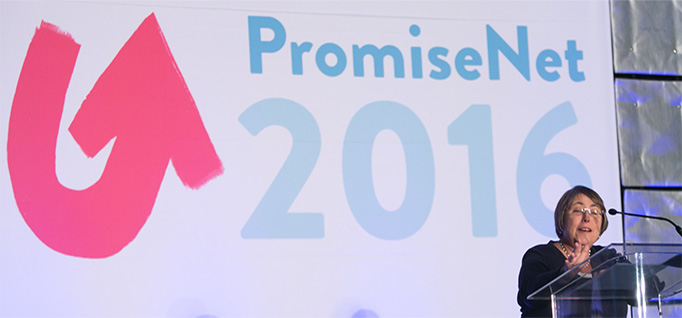Promise programs yield some promising results
By Matthew Dembicki
November 2, 2016
Although the college Promise movement is still young, researchers are already examining what makes the programs tick.
University and think-tank researchers on Oct. 26 presented at the annual PromiseNet conference in Washington, D.C., findings on several locally based Promise programs. About 85 of the more than 150 Promise programs across the country are locally based, compared to being state or institution based.
The researchers shared findings on outcomes related to pre-K-12, postsecondary education, and community and economic development. In general, the Promise programs that were studied — which included programs in Kalamazoo, Michigan; El Dorado, Arkansas; Pittsburgh; Syracuse and Buffalo in New York; and the Promise Project in Milwaukee, Wisconsin — showed encouraging starts to the programs, with increases in K-12 and postsecondary enrollments and persistence, especially among those from underserved backgrounds.
Academic improvements also appear on the increase in some of the programs. Research on the El Dorado Promise shows that Promise students in grades 3 through 8 improved on state standardized exams in math and literacy between 2007 and 2012, according to Gary Ritter, an education policy professor at the University of Arkansas.
Ritter said the El Dorado Promise has prompted three key changes in the community that are driving the positive results: It has helped instill a discussion of college across all levels of education; It has increased academic and college expectations for all students; and advanced coursework is now offered and encouraged for all students.
Advanced placement courses were “country club,” but are now “parks and rec,” he said.
Ditch eligibility requirements?
Many Promise programs have academic and attendance requirements for students to participate in the program. But findings from The Degree Project in Milwaukee — which is a learning project and not a running Promise program — show mixed results with such requirements. In fact, outcomes among students in the program who met the eligibility requirements didn’t improve, while the outcomes for those with no requirements did improve, according to Doug Harris, an economics professor at Tulane University in Louisiana.
Harris speculated that such program requirements reduce the effectiveness of Promise programs, adding that they can undermine the program by “downshifting” students to “lower-quality colleges.” Academic requirements such as a minimum GPA also set the programs to focus on serving a select group of students rather than trying to change the culture and success of an entire school, he said.
Find out about other Promise programs and more research in the full Community College Daily article.
Is your college involved in a Promise program? Tell us about it on LinkedIn.



